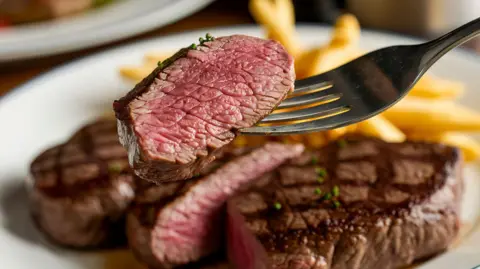In recent developments regarding the trade between the United Kingdom and the United States, the UK government has reaffirmed its stance that hormone-treated beef will not be permitted to enter the UK market as part of a newly signed trade agreement. This announcement follows concerns raised by farmers and consumers alike about the implications of increased beef imports stemming from the deal, which aims to bolster trade relations in both directions.
Concerns regarding hormone-treated beef have been prominently voiced by UK beef farmers, including Ian McCubbine, a farmer from Surrey. Speaking on the BBC Radio 4’s Today programme, McCubbine articulated his apprehension about the safety of meat products that could potentially flood the market. His comment, “How do we know what they are putting in?” encapsulates the broader skepticism among consumers about the practices involved in American beef production.
In response to these concerns, government officials have reiterated that maintaining high food standards in the UK remains a fundamental priority. During the trade negotiations, officials declared that the certification processes and rigorous border checks are set in place to ensure that hormone-treated beef will not be allowed entry into the UK. Darren Jones, the Chief Secretary to the Treasury, emphasized that the rules governing food standards have not and will not change as a result of this trade deal, aiming to reassure British consumers about the quality of food they purchase.
Historically, the UK has prohibited the importation of hormone-treated beef since 1989 when such practices were banned across the European Union due to health safety concerns. However, in the US, many farmers routinely use growth hormones to enhance the muscle mass of cattle, which ultimately results in lower beef prices. Contrarily, producers in the US and other nations that use such methods argue that there are no health risks associated with hormone-treated beef, a claim many UK consumers remain skeptical about. This skepticism is echoed in social media sentiments, where some consumers express their intention to prioritize UK-produced beef in their purchasing decisions.
As part of the recent trade agreement, the UK has agreed to allow the importation of up to 13,000 metric tonnes of US beef without tariffs. This marks a significant change from the current situation, where only about 1,000 tonnes of beef is exported from the US to the UK under a 20% tariff. In return, the UK is granted the ability to sell a similar quantity of beef to the US under lower tariffs than are currently imposed, enhancing reciprocal trade relations. This deal has broader implications beyond just meat, as it also includes reduced tariffs on UK-made automobiles heading to the United States and on US ethanol exports to the UK.
However, concerns remain about the practicality of maintaining food safety standards, particularly given the inadequacies noted in the current border-checking systems. Liz Webster, founder of the advocacy group Save British Farmer, expressed her frustration on social media, indicating that while the deal appears beneficial, the enforcement of food safety standards seems uncertain. UK authorities have indicated that US beef producers must adhere to stringent monitoring and certification requirements to demonstrate compliance with the UK’s food safety standards.
Defra, the UK’s Department for Environment and Rural Affairs, has reported that any traces of hormones used in beef production would be detectable during standard checks. This scenario aligns with the positions of various stakeholders, including the National Farmers Union, which is actively seeking clarification from Defra on the specifics of the trade deal to ensure that compliance with safety standards is maintained throughout the import process.
The ongoing discourse around the US-UK trade deal highlights the delicate balance between trade advantages and food safety, as the government, farmers, and consumers navigate the implications of increased foreign imports against the backdrop of longstanding food standards. As the trade landscape evolves, the discussions around hormone-treated beef are likely to continue, reflecting varying interests and preferences among stakeholders in the agricultural sector.



